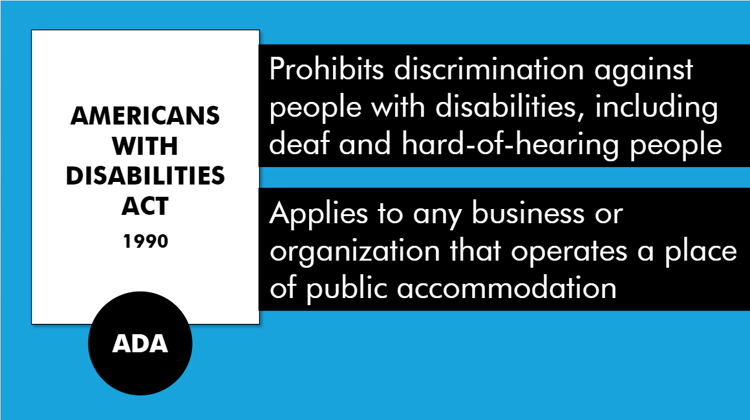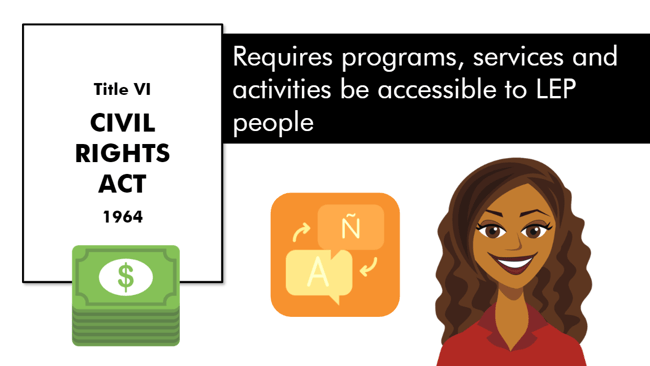RESOURCES

ADA Resources
What type of businesses fall under ADA Title III (Public Accommodations?)
Title III of the Americans with Disabilities Act (ADA) requires businesses open to the public to ensure that individuals with a disability have equal access to all that the businesses have to offer. The Title III regulation covers — Public accommodations, Commercial facilities, and also Private entities that offer certain examinations and courses related to educational and occupational certification.
Places of public accommodation include over five million private establishments, convention centers, retail stores, shopping centers, dry cleaners, laundromats, pharmacies, hospitals, museums, libraries, zoos, amusement parks, private schools, daycare centers, health spas, bowling alleys, hotels, theaters, restaurants, doctors’ and lawyers’ offices, optometrists, dentists, banks, insurance agencies, museums, parks, libraries, recreational programs, social service agencies, and private schools.
Commercial facilities are nonresidential facilities, including office buildings, factories, and warehouses, whose operations affect commerce. It covers both profit and non-profit organizations. Unlike the employment section of the ADA, which only applies to employers with 15 or more employees, ADA Title III applies to all businesses, regardless of size.
LEGAL REQUIREMENTS UNDER THE
AMERICANS WITH DISABILITIES ACT (ADA)
K-12 Education
- Deaf Children's Bill of Rights (Available in 13 states)

Low-English Proficiency (LEP)
What type of businesses fall under the Civil Rights Act of 1976 (Title VI)
Any organization or individual that receives Federal financial assistance, either directly or indirectly, through a grant, contract or subcontract, is covered by Title VI. Examples of covered entities include hospitals, nursing homes, home health agencies, HMOs, health service providers, and human services organizations.
All organizations or individuals that are recipients of Federal financial assistance from HHS have an obligation to ensure that LEP persons have meaningful and equal access to benefits and services. (U.S. Department of Health and Human Services)
K-12 Education
LEGAL REQUIREMENTS UNDER THE
Civil Rights Act (Title VI)
No person in the United States shall, on ground of race, color, or national origin, be excluded from participation in, or be denied the benefits of, or be subjected to discrimination under any program or activity receiving Federal financial assistance.
Examples of how to follow the law:
- Hiring staff interpreters
- Contracting for interpreter services
- Contracting for video or phone interpreting services
- Engaging community volunteers
- Translate written documents for distribution
Q1: Which health care providers are covered under the ADA?
Title III of the ADA applies to all private health care providers, regardless of the size of the office or the number of employees. 28 C.F.R 36.104.
It applies to providers of both physical and mental health care. Hospitals, nursing homes, psychiatric and psychological services, offices of private physicians, dentists, and health clinics are included among the health care providers covered by the ADA. If a professional office of a doctor, dentist, or psychologist is located in a private home, the portion of the home used for public purposes (including the entrance) is considered a “place of public accommodation.” 28 C.F.R. 36.207
Q2: What is the obligation of health care providers under the ADA for individuals who are Deaf or hard of hearing?
Health care providers have a duty to provide auxiliary aids and services that ensure that communication with people who have a hearing loss is as effective as communication with others. C.F.R. 36.306
Q3: Whom must a healthcare provider offer effective communication?
A health care provider must ensure that it can communicate effectively with customers, clients, and other individuals with hearing loss who are seeking or receiving its services. 56 Fed. Reg. at 35565.
Such individuals may not always be “patients” of the health care provider. For example, if prenatal classes are offered as a service to both fathers and mothers, a father with a hearing loss must be given auxiliary aids or services that offer him the same opportunity to benefit from the classes as would other fathers. Similarly, a Deaf parent of a hearing child may require an auxiliary aid or service to give informed consent for the child’s surgery.
Q4: What kinds of auxiliary aids and services are required by the ADA to ensure effective communication with individuals with hearing impairments?
Appropriate auxiliary aids and services may include services and devices such as qualified interpreters, assistive listening devices, note-takers, written materials for individuals with hearing impairments; qualified readers, taped texts, and Brailed or large print materials for individuals with vision impairments. 28 C.F.R. 303(b)(1)
Q5: How does a health care provider determine which auxiliary aid or service is best for a patient with a hearing loss?
The auxiliary aid requirement is flexible, and the healthcare provider can choose among various alternatives as long as the result is effective communication for the individual with a hearing loss. A person with a hearing loss knows best which auxiliary aid or service will achieve effective communication with their health care provider.
The Justice Department expects that the health care provider will consult with the patient and consider carefully his or her self-assessed communication needs before acquiring a particular aid or services. 56 Fed. Reg. at 35566-67.
Q6: Why are auxiliary aids and services so important in the medical setting?
Auxiliary aids and services are often needed to provide safe and effective medical treatment. Without these aids and services, medical staff run the grave risk of not understanding the patient’s symptoms, misdiagnosing the patient’s medical problem, and prescribing inadequate or even harmful treatment.
Similarly, patients may not understand medical instructions and warnings or prescription guidelines.
Q7: Are there any limitations on the ADA’s auxiliary aids and services requirements?
Yes. The ADA does not require the provision of any auxiliary aid or service that would result in an undue burden or in a fundamental alteration in the nature of the goods or services provided by a health care provider. 28 C.F.R. 36.303(a)
However, the health care provider is not relieved from the duty to furnish an alternative auxiliary aid or service, if the provision of that aid or service would not result in a fundamental alteration or undue burden. 28 C.F.R. 36.303(f)
Both of these limitations are derived from existing regulations and case law under section 504 of the Rehabilitation Act and are to be determined on a case-by-case basis.
Q9: Does a provider pay for an auxiliary aid or service for a medical appointment if the cost of that aid or service exceeds the provider’s charge for the appointment?
In certain situations, the cost of providing an auxiliary aid or service (for example, an interpreter) to achieve effective communication in administering a particular medical service may exceed the charge to the patient for that very same service.
A healthcare provider is expected to treat the costs of providing auxiliary aids and services as part of the overhead costs of operating a business. Accordingly, so long as the provision of the auxiliary aid or service does not impose an undue burden on the provider’s business and does not fundamentally alter the provider’s services, the provider may be obligated to pay for the auxiliary aid or service in this situation.
Q10: Can a healthcare provider charge a Deaf or hard of hearing patient for the costs of providing an auxiliary aid or service?
No. A health care provider cannot charge a patient for the costs of providing auxiliary aids and services, either directly or through the patient’s insurance carrier.
Q11: Who is qualified to be an interpreter in a health care setting?
A qualified interpreter is an interpreter who is able to interpret effectively, accurately, and impartially both receptively and expressively, using any necessary specialized vocabulary.
Global Interpreting makes sure our interpreters are trained and vetted